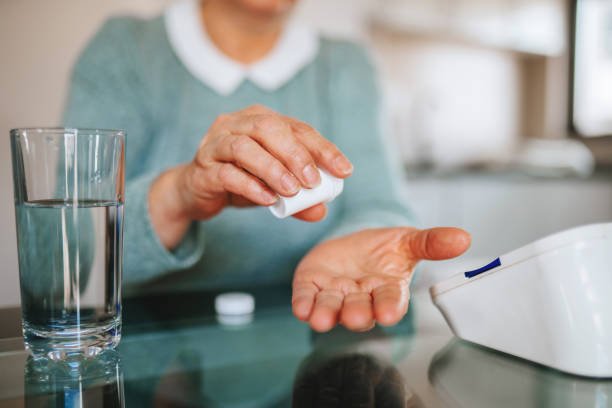
Take Your Blood Pressure Medicines! Efficacy, Side Effects and Precautions of 8 Types of High Blood Pressure Drugs
When the seasons change, it brings not only the discomfort of a sudden drop in temperature, but also the hidden worry of cardiovascular disease due to vasoconstriction leading to an increase in blood pressure. According to a survey report by the Ministry of Health and Welfare, high blood pressure is one of the leading causes of cardiovascular disease, stroke, diabetes, kidney disease, and cardiovascular disease. It is a common risk factor for major chronic diseases such as diabetes and currently ranks first in the global burden of disease, making high blood pressure like a ticking time bomb in the body.
Therefore, when facing patients with hypertension, doctors will decide which hypertension drugs to use for treatment based on the patient’s physical condition. But since it is a drug, it must have side effects. In addition, interactions between drugs should not be taken carelessly to avoid affecting the efficacy or even causing danger. This article summarizes the following 9 common high blood pressure drugs, and explains how these high blood pressure drugs reduce blood pressure, side effects, and precautions when using high blood pressure drugs.
Hypertension Drug 1: Diuretics
When a patient has too much sodium in their blood, the water content of the blood will also increase to lower the sodium concentration. This increases the pumping pressure of the heart, causing an increase in blood pressure, and an increase in body fluid volume, which may also cause edema in the patient. Therefore, by using diuretics to increase urine output and help the kidneys excrete excess water, edema can be eliminated and blood pressure lowered, which is the first-line medication for hypertension.
Diuretic side effects and precautions
Using diuretics to accelerate the body’s elimination of water may cause symptoms such as frequent urination, dehydration, hyponatremia, and postural hypotension (Orthostatic hypotension).
Using furosemide (one of the diuretics) alone or taking digoxin (also known as digitalis) at the same time may cause potassium ion loss and hypokalemia. You may need to supplement with high-potassium fruits such as grapes, bananas, and cantaloupe (but please ask your doctor first if this is necessary).
Taking medication at night will cause frequent urination at night and affect sleep. It is recommended to take medication a few hours in advance to avoid a decrease in sleep quality.

When the seasons change, it brings not only the discomfort of a sudden drop in temperature, but also the hidden worry of cardiovascular disease due to vasoconstriction leading to an increase in blood pressure. According to a survey report by the Ministry of Health and Welfare, high blood pressure is one of the leading causes of cardiovascular disease, stroke, diabetes, kidney disease, and cardiovascular disease. It is a common risk factor for major chronic diseases such as diabetes and currently ranks first in the global burden of disease, making high blood pressure like a ticking time bomb in the body.
Therefore, when facing patients with hypertension, doctors will decide which hypertension drugs to use for treatment based on the patient’s physical condition. But since it is a drug, it must have side effects. In addition, interactions between drugs should not be taken carelessly to avoid affecting the efficacy or even causing danger. This article summarizes the following 9 common high blood pressure drugs, and explains how these high blood pressure drugs reduce blood pressure, side effects, and precautions when using high blood pressure drugs.
Hypertension Drug 1: Diuretics
When a patient has too much sodium in their blood, the water content of the blood will also increase to lower the sodium concentration. This increases the pumping pressure of the heart, causing an increase in blood pressure, and an increase in body fluid volume, which may also cause edema in the patient. Therefore, by using diuretics to increase urine output and help the kidneys excrete excess water, edema can be eliminated and blood pressure lowered, which is the first-line medication for hypertension.
Diuretic side effects and precautions
Using diuretics to accelerate the body’s elimination of water may cause symptoms such as frequent urination, dehydration, hyponatremia, and postural hypotension (Orthostatic hypotension).
Using furosemide (one of the diuretics) alone or taking digoxin (also known as digitalis) at the same time may cause potassium ion loss and hypokalemia. You may need to supplement with high-potassium fruits such as grapes, bananas, and cantaloupe (but please ask your doctor first if this is necessary).
Taking medication at night will cause frequent urination at night and affect sleep. It is recommended to take medication a few hours in advance to avoid a decrease in sleep quality.

When the seasons change, it brings not only the discomfort of a sudden drop in temperature, but also the hidden worry of cardiovascular disease due to vasoconstriction leading to an increase in blood pressure. According to a survey report by the Ministry of Health and Welfare, high blood pressure is one of the leading causes of cardiovascular disease, stroke, diabetes, kidney disease, and cardiovascular disease. It is a common risk factor for major chronic diseases such as diabetes and currently ranks first in the global burden of disease, making high blood pressure like a ticking time bomb in the body.
Therefore, when facing patients with hypertension, doctors will decide which hypertension drugs to use for treatment based on the patient’s physical condition. But since it is a drug, it must have side effects. In addition, interactions between drugs should not be taken carelessly to avoid affecting the efficacy or even causing danger. This article summarizes the following 9 common high blood pressure drugs, and explains how these high blood pressure drugs reduce blood pressure, side effects, and precautions when using high blood pressure drugs.
Hypertension Drug 1: Diuretics
When a patient has too much sodium in their blood, the water content of the blood will also increase to lower the sodium concentration. This increases the pumping pressure of the heart, causing an increase in blood pressure, and an increase in body fluid volume, which may also cause edema in the patient. Therefore, by using diuretics to increase urine output and help the kidneys excrete excess water, edema can be eliminated and blood pressure lowered, which is the first-line medication for hypertension.
Diuretic side effects and precautions
Using diuretics to accelerate the body’s elimination of water may cause symptoms such as frequent urination, dehydration, hyponatremia, and postural hypotension (Orthostatic hypotension).
Using furosemide (one of the diuretics) alone or taking digoxin (also known as digitalis) at the same time may cause potassium ion loss and hypokalemia. You may need to supplement with high-potassium fruits such as grapes, bananas, and cantaloupe (but please ask your doctor first if this is necessary).
Taking medication at night will cause frequent urination at night and affect sleep. It is recommended to take medication a few hours in advance to avoid a decrease in sleep quality.












